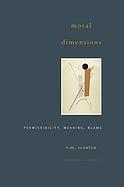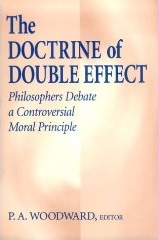- Instructor:
- Richard
Lee (Office
hours)
- Course number:
- PHIL 5983 002 (ISIS
number: 14122)
- Time:
- W 4:00 p.m. - 6:50 p.m.
- Room:
- MAIN
203
- Pre-requisites:
- Graduate standing or permission of the
instructor
- Brief Description:
-
The Doctrine of Double Effect, which has its roots in Thomistic Ethics, is a
purported deontological constraint on the permissibility of action. This principle
(according to one formulation) holds that an action is permissible if it is a choice
which "is either good or
indifferent from which there follows a twofold effect, one good, the other evil, if
a proportionate grave reason is present, and if … the agent … does not
intend the evil effect." (Gury, quoted in Woodward p.8) After analyzing the notion of
intention we'll look at various formulations of the principle, defenses of it, and
objections to it. T. M. Scanlon begins his recent book Moral Dimensions:
Permissibility, Meaning, and Blame with a critique of this
principle. After studying the basics of Scanlon's contractualist theory of
morality (in his earlier writings), we'll scrutinize Scanlon's take on
the doctrine of double effect and his
subsequent account of moral blame. Finally we will explore applications of
the doctrine of double effect, especially in "just war theory."


- Texts:
-
- P.A. Woodward, editor, The Doctrine of Double Effect: Philosophers Debate
a Controversial Moral Principle (University of Notre Dame Press, 2001)
ISBN-10: 0268008973
- T. M. Scanlon, Moral Dimensions: Permissibility, Meaning, Blame
(Belknap Press, 2008) ISBN-10: 0674031784
- Materials on electronic reserve
- Materials available on the web
Other information:
Richard Lee,
rlee@uark.edu,
last modified: 7 April 2010
